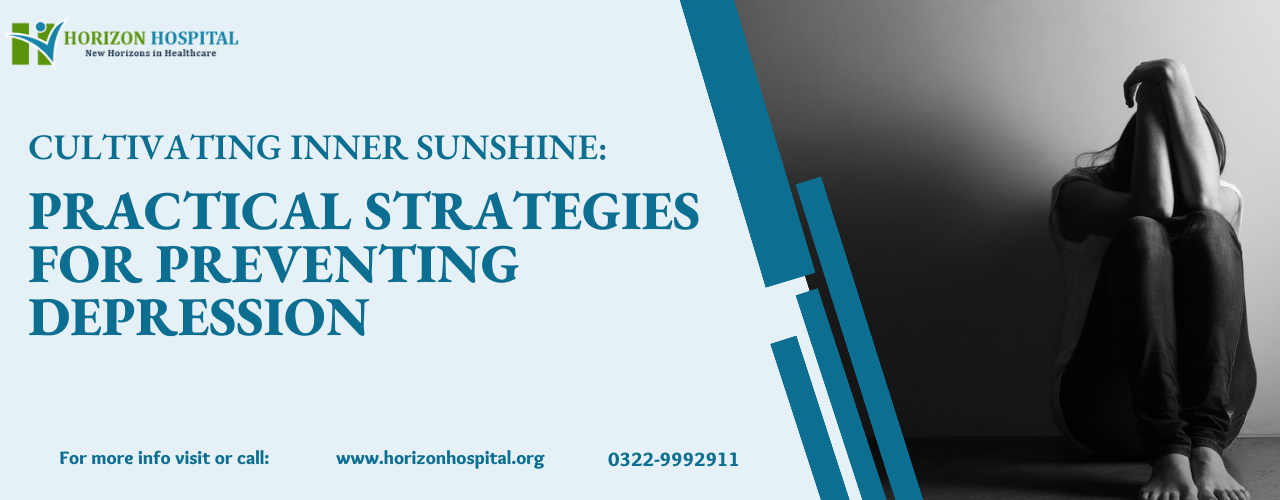
Cultivating Inner Sunshine: Practical Strategies for Preventing Depression
Depression affects millions of people worldwide, causing severe mental health issues. While its causes are intricate and multifaceted, the good news is that there are proactive steps we can take to enhance our mental well-being and reduce the likelihood of depression. This article explores practical strategies to help you cultivate inner positivity and navigate life’s obstacles more effectively.
Fostering Healthy Habits: The Cornerstone of Prevention
1- Building a Balanced Diet:
Feeding your body A well-rounded diet including fruits, vegetables, whole grains, and lean protein benefits your brain and nervous system. These foods provide essential vitamins, minerals, and antioxidants that contribute to emotional well-being. Conversely, processed foods high in sugar, saturated fats, and refined carbohydrates can exacerbate mood swings and contribute to feelings of fatigue.
Focus on including fresh, whole foods such as leafy greens, berries, nuts, and fatty fish in your diet.
Make sure you stay adequately hydrated by consuming a proper amount of water every single day.
Reduce consumption of sugary drinks and processed foods that cause mood swings due to blood sugar fluctuations.
2- Prioritizing Quality Sleep:
It is essential to get enough sleep to maintain good mental and physical health. While we sleep, our brains perform crucial functions such as processing information, consolidating memories, and regulating emotions. Chronic sleep deprivation disrupts these processes, making us more susceptible to stress, anxiety, and depression.
It is recommended to aim for 7-8 hours of high-quality sleep every night.
Develop a consistent sleep routine by sleeping and waking at the same time every day, even on weekends.
Create a relaxing bedtime routine that prepares your mind and body for sleep, such as taking a warm bath, reading a book, or practicing relaxation techniques.
3- Embracing the Power of Exercise:
Physical activity is a potent mood booster. Exercise releases endorphins, natural mood elevators that combat stress hormones and contribute to feelings of well-being.
⇒ Engage in regular physical activity:
It is recommended to aim for at least 30 minutes of moderate-intensity exercise on most days of the week.
⇒ Find activities you enjoy :
Options like brisk walking, swimming, dancing, or team sports can make exercise feel less like a chore.
Start gradually and increase the duration and intensity of your workouts as your fitness level improves.
Building Resilience: Managing Stress and Building Coping Mechanisms
1- Identifying and Addressing Stressors:
⇒ Stress is a natural part of life, but chronic, unmanaged stress disrupts mental and physical well-being. Recognizing your stressors is the first step to effectively managing them.
⇒ Keep a stress journal to identify patterns and triggers that contribute to your stress levels.
⇒ Learn to say no to unrealistic expectations or commitments that drain your energy and time.
⇒ Practice time management skills to prioritize tasks and avoid feeling overwhelmed.
2- Cultivating Relaxation Techniques:
Developing healthy coping mechanisms equips you to respond effectively to stress and navigate life’s challenges proactively:
⇒ Mindfulness and meditation:
Techniques like mindfulness meditation help cultivate awareness of the present moment and promote relaxation.
⇒ Deep breathing exercises:
Slow, deep breaths activate the body’s relaxation response, lowering stress hormones and calming the nervous system.
⇒ Progressive muscle relaxation:
This technique involves tensing and relaxing different muscle groups, promoting physical and mental release.
Social Connection: The Power of Belonging
1- Strengthening Social Bonds:
⇒ Strong social connections are vital for emotional well-being. Humans are social creatures who thrive on interaction and support. Nurturing positive relationships provides a sense of belonging, purpose, and a safety net during difficult times.
⇒ Make time for loved ones and schedule regular social activities with friends and family.
⇒ Join a club or group that aligns with your interests, creating opportunities to meet new people and build meaningful connections.
⇒ Volunteer your time to a cause you care about, fostering a sense of purpose and social connection
2- Maintaining Healthy Boundaries
⇒ While social connection is crucial, setting healthy boundaries protects your emotional well-being. This involves learning to say no to unreasonable demands and distancing yourself from toxic relationships.
⇒ Communicate your needs assertively and respectfully when necessary.
⇒ Limit interaction with negative or draining individuals.
⇒ Recognize the importance of self-care and prioritize activities that replenish your energy.
Seeking Help: Recognizing the Need for Professional Support
1- Early Intervention is Key:
Depression can be a debilitating condition, but it is treatable. If you experience persistent symptoms such
- Persistent feelings of sadness, hopelessness, or worthlessness
- Loss of interest or pleasure in activities you once enjoyed
- Significant changes in appetite or sleep patterns
- Decreased energy or fatigue
- Difficulty concentrating or making decisions
- Restlessness or feelings of being slowed down
- Recurrent thoughts of death or suicide
Seeking professional help is essential for managing depression. A therapist or counselor can provide guidance, support, and tools to develop coping mechanisms and improve outcomes. Early intervention is critical to prevent depression from worsening.
Conclusion: Cultivating a Life of Resilience
Preventing depression is a multifaceted approach that encompasses healthy habits, stress management techniques, nurturing social connections, and seeking professional support when needed. By prioritizing self-care, fostering emotional well-being, and building resilience, we can create a foundation for navigating life’s challenges with greater strength and cultivate a life filled with inner sunshine.
Remember:
⇒ You are not alone. Depression is a commonly occurring condition, and it is important to know that help is readily available.
⇒ Taking proactive steps to prevent depression empowers you to take control of your mental health.
